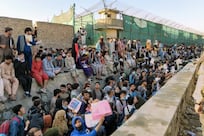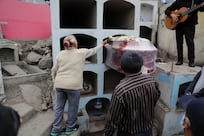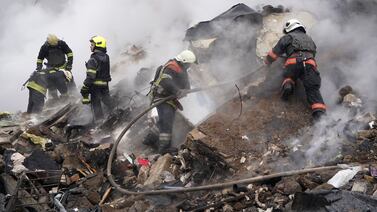The US has hailed the first appearance of a “more or less united” Libyan government for many years after the first day of talks in Berlin that seek to build on the ceasefire agreed to in Libya last year.
A senior State Department official highlighted the importance of elections expected to take place in December, to support the process of removing the foreign fighters in Libya.
The interim Government of National Unity was formed in February, taking over from the five-year-old, internationally recognised Government of National Accord and a separate eastern-based administration, but an election is scheduled for December 24 to establish a new government.
Years of conflict in the oil-rich North African country has led to the presence of thousands of foreign mercenaries.
“It’s the first appearance by a sovereign, Libyan, more or less united … government in a long, long time and they made their appearance on the international stage,” the senior US State Department official said in Berlin, after the first day of talks attended by representatives from a number of countries and the GNU Prime Minister and Foreign Minister.
The US representative said the December elections were important “not just to legitimise a long-term, credible Libyan government” but also in regards to “foreign forces, mercenaries, and fighters”.
“A fully empowered, legitimate Libyan government will be in a much stronger position to turn to some of these foreign actors and say, ‘Thank you very much, it’s our country now and we’d like to be the ones to define the security co-operation relationships that we’re going to have and not have them imposed on us’,” the official said.
There was not a concrete agreement on how to approach the withdrawal of foreign fighters, however.
The Turkish Parliament approved Ankara’s military intervention in January 2020 after an appeal for help from the Tripoli-based GNA, as rival factions attacked the capital.
Although a ceasefire has since been agreed to, the Turkish military remains in western Libya supposedly in a training capacity. Also in the country are Russian Wagner Group mercenaries who fought alongside forces aligned with eastern commander Field Marshal Khalifa Haftar.
“The Turks did a footnote on the language that relates to foreign forces because the Turks believe their trainers are there with a … viable agreement with a legitimate Libyan government, the previous Government of National Accord,” the US official said.
“So they don’t like being equated with foreign fighters and mercenaries, and the German foreign minister, I noticed at their press conference, made that point publicly.”
Turkey also sent thousands of Syrian mercenaries to bolster western Libyan forces.
The October 2020 ceasefire included a demand that foreign fighters leave Libya within 90 days and paved the way to the GNU.
German Foreign Minister Heiko Maas said the meeting “marked a new phase" and that “we are no longer only talking about Libya, but above all with Libya.”











